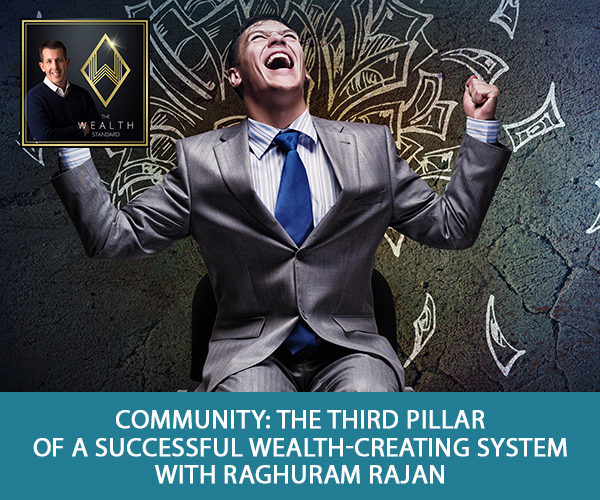Community: The Third Pillar Of A Successful Wealth-Creating System with Raghuram Rajan
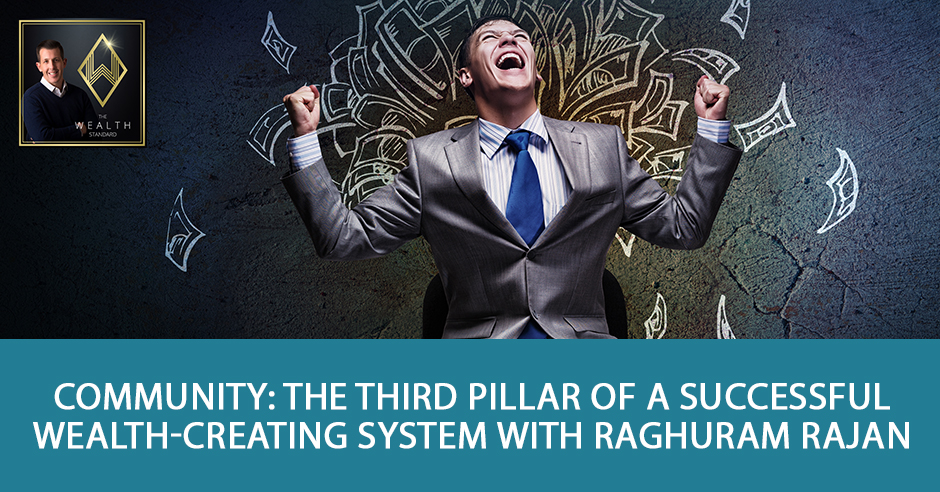
—
Listen to the podcast here:
Community: The Third Pillar Of A Successful Wealth-Creating System with Raghuram Rajan
The world is changing daily. New technology, businesses, toys, games and movies, yet there is a growing concern about the gap between the wealthy and the poor. Presidential candidate Andrew Yang proposes UBI, Universal Basic Income. Alexandria Ocasio-Cortez proposes sweeping centrally-driven reform, but it begs the question, “What is the root of the problem? Why would we give the government even more power when their initiatives of the past have always fallen short of expectations?” My guest may be unfamiliar to most of you, but his resume is beyond impressive. He was featured in Inside Job when he was Chief Economist at the IMF, International Monetary Fund. It’s where he openly challenged Alan Greenspan, then the Chairman of the Federal Reserve, at the iconic Jackson Hole Economic Summit in 2005. The challenge was a controversial paper he wrote that cited the excessive risk-taking of certain investors with no corresponding consequence. He was scoffed at by almost everyone there but was vindicated when the world financial system almost collapsed because of what he claimed.
He was named as one of the 100 Most Influential People in the World by Time Magazine and has written three bestselling books, Fault Lines: How Hidden Fractures Still Threaten the World Economy, Saving Capitalism From The Capitalists: Unleashing the Power of Financial Markets to Create Wealth and Spread Opportunity, and The Third Pillar: How Markets and the State Leave the Community Behind. He’s Dr. Raghuram Rajan, a former Governor of the Reserve Bank of India. He’s also the former Vice Chairman of the Bank for International Settlements. He is the Katherine Dusak Miller Distinguished Service Professor of Finance at the University of Chicago.
This season, we’re talking about entrepreneurship and intrapreneurship, the development of the individual and the difference they can make in their own life and the life of others. I felt that Dr. Rajan’s perspective of the role of community as part of the global landscape is compelling and it reinforces what individuals can achieve in a certain environment. The wealth gap and the rise of poverty is an issue. The typical narrative is that the society safety net, i.e. welfare and money is the solution. That method is easy but ultimately, it’s a Band-Aid, a short-term solution if anything. The lasting change for all individuals requires a mindset change and only the individual can do that. Not a handout, not a paycheck that they don’t earn, but them themselves making that mindset change. I hope you enjoy this second episode of season two of the show. If you like it, don’t forget to spread the word. Leave your review in iTunes and please share this episode on Facebook, LinkedIn or Instagram and get the word out especially for Dr. Rajan and his book.
—
It is such an honor to have Raghuram Rajan on the show. I’m excited to be discussing your book, but also discussing your perspective on where we stand as an economy and a society. Thanks for taking the time to join us.
Thanks for having me.
You have such an impressive list of accolades. Where did your drive to pursue the career path that you’re on right now come from? What were some of the defining events in your life that impacted the way that you see it?
Different people have different views on where you are. Where I have contributed has been in the area of both economic theorizing and research as well as economic policymaking. If you look from the beginnings, I would say it comes from growing up in a poor country and asking, “Why on earth are we poor? What is it that we’re doing, which keeps us this way?” I had been to other countries that were much richer and trying to figure out what the difference was. It certainly wasn’t the caliber of the people. It seemed to be something else that was making a difference and to that extent, that was in many ways the motivating force behind getting into economics.
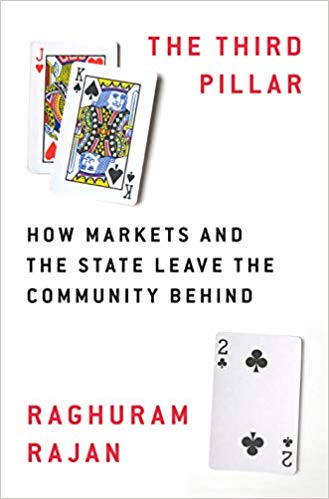
The Third Pillar: How Markets and the State Leave the Community Behind
My wife is from a third world country and when you live in certain circumstances, you tend to accept the circumstances as they are, but once you see the contrast, that’s when those questions begin. What are some of the general conclusions you came to as an answer to that question?
It’s an evolving process. “The question’s always remained the same. The answers change.” I’ve seen the answers change to this question, “Why are we poor?” The answer’s changed over my lifetime. I have a somewhat different set of answers than I would have had as a twenty-year-old. As a young person, you think it’s all about some people having appropriated all the fruits and that’s part of the answer, but it doesn’t explain why they need to keep it for themselves. Why there aren’t more opportunities for everyone else. The easy answer to that point is let’s tax the rich. Let’s spread it all around and we’ll be fine and then you realize the answer’s a little more complicated.
You have to figure out how you create opportunities for everybody. That’s to my mind the real question. How in every country do we create the possibility for everybody to reach their limits? That means first creating capabilities in people. We’re not born as fully-fledged adults with a Ph.D. degree. We acquire all of this on the way. How do we create the environment? That’s where my book on the community, how do we create an environment that enables you to get to that place? Once you have those capabilities, how does the system create incentives for you to use them in the best way possible? How does it make sure that some people don’t appropriate most of the fruits and it’s more widely spread? How do we keep a level playing field both at the beginning, but also along the way? That seems to me the systemic questions we have to answer. It’s not clear to me as I grow older that it’s a menu where we pick pieces from the menu, “I like this, I like that.” It seems more like an equilibrium where a bunch of things happens together and you have to make compromises. “I like this and I like that, I don’t like something,” but that’s part of the reason or that’s how you enjoy the things that you enjoy. You have to give up some other things for that.
I want to talk about some of your past and some of the experiences that you’ve had over the last several years, specifically you’ve been in the positions of authority and influence. Let’s dive into The Third Pillar book that you came out with because I think they all tie together. Would you mind explaining first what the pillars are, specifically what that third pillar is and why you decided to focus the book around that pillar?
To some extent, I was looking at what I thought was possibly the most successful wealth-creating system we’ve had in history, which was the postwar liberal market society. That has three words, liberal, market and I would say, democracy is the third word. Liberal means the state which allows people to flourish. A state which is limited but does what it’s supposed to do to maintain law and order. The market is well understood. That to my mind is the second pillar. There’s society, there’s a community working through democracy to keep the system free, fair and open to everyone. The third pillar in my view is community, but it also implies democracy. It also implies a broader society, which essentially works together.
When you have these, you have the conditions for success as a society. Some people want democracy, but they don’t want markets. Some people want government and democracy, but they don’t want markets. In my mind, the three hold together. The first part of the book is trying to tell you why the three fit together. For example, an independent private sector flourishing in a competitive market is important because it acts as an independent source of the bar. It balances the mighty bar of the state. That balance is important, otherwise an overweening state has a tendency of becoming authoritarian. No matter what democratic structures you have, the state which is unbalanced by other parts.
Look around the world. When you see Turkey led by Erdoğan who has few constraints on his authority. You understand the private sector in Turkey is not much of restraint and understandably because the state controls many levers over the private sector, whether its ability to take away credit or its ability to refuse permissions here and there. You need a more open, flourishing competitive market where you can have the likes of the New York Times or The Washington Post holding the administration in check. You can have a Fox News holding the previous administration in check. You need these independent private sector powers. I’m not saying it’s ideal in the United States, I’m saying that the private sector is more independent than the other countries.
Your perspective is interesting, but I also believe it may not be the perspective that’s held by everyone. You have enjoyed a seed at seeing the world from many different places. I look at those that are in the community and how they’re viewing the challenges and the imbalance because most would agree that there’s an imbalance. When it comes to the environment, what you and I understand as the best environment and what a person that’s had no experience leading Central Indiana or Central Florida, having a limited perspective on things, they would want the same thing in the end. Yet they’re all disagreeing on the environment because that’s where you come in with a lot of AOC and Bernie Sanders and this notion of communism, which is a community. It comes to that third pillar. How has your experience over the years shaped the perspective on how strong you feel about a specific type of environment to allow this third pillar to be as influential as the other two pillars essentially?
How well you will do income-wise is not the same thing as how well you will do happiness-wise. Click To TweetIt’s not my feelings. What is clear even in the United States, which is a country by many counts doesn’t emphasize the community anymore. Even now, you find that community matters. Some powerful work by Raj Chetty, an economist at Harvard, shows that which community you grew up in essentially determines what your income will be for the rest of your life. He does this by looking at kids that move between communities. You moved from a community which is low down on the performance scale to a community which is much higher up in the performance scale. It makes a world of difference in your life chances. Community matters even in the United States, where some people would argue the community is deemphasized.
Why does it matter? Because it gets you the start in terms of your early education, the early schooling you go to, the values you espouse, your identity, your sense of who you are and your ambitions. You talked about some places in rural Indiana, the ambitions of kids there and I’ve talked to a bunch of them are quite different from the ambitions of kids in New York City. In that sense, it does matter and it does set how well you will do going forward in your life. How well you will do income-wise is not the same thing as how well you will do happiness wise. There are differences between the two. In general, if we want capitalism to work, people, wherever they are in the country, should have the feeling that it works reasonably well for them. They’re not doomed right from the beginning because of where they started.
That’s our challenge because the requirements for participating in the capitalist economy have been increasing because of technological change. The skills you require are far higher than the skills a kid required 100 years ago. A high school education no longer cuts it. How do you get the skills that you need in the communities you’re growing up in? We can’t bring everybody to San Francisco and New York City. You have to have much more community-centered development. The problem is that it’s a vicious circle. When economic activity leaves a community, the big employer in town closes down. What follows is everything else starts breaking down. Your social relationships start breaking down, marriages break down, more divorces, more teenage pregnancies and more drug use. Your school starts breaking down and then you have a much lower chance of succeeding in the economy. Not just you, but your kids.
It’s a vicious circle. How do we break that vicious circle? We’ve had many areas like this in the country in the past, but they’re increasing. The question is how do we reverse this process? The answer is not lower interest rates. Similarly, it doesn’t mean have more fiscal spending. It typically means much more targeted, often bottom-up processes by which we rebuild activity in the community. Bring more jobs, employees and new skills. That means community involvement. It also means outside support, but we need to be much cleverer about this then we’ve been so far.
Maybe go through some of the research that you went through to prove out or to support your thesis. The world is rapidly evolving and you make certain claims regarding how the things of life are becoming much easier, whether it’s the food we have, transportation, or entertainment. It’s unprecedented as you compare it to 100 years ago or even 50 years ago. An individual’s fulfillment and their positive experience of life are being involved in making a difference and contributing in a sense. What things did you do to support some of the methods and direction of strengthening this third pillar?

Community: Because of technological change, the easy jobs in the middle are gone. You’re left with a choice of either the low-skill job or the high-skill job.
The phenomenon I’m pointing to is mental level phenomena. You point to a number of studies which point in the same direction, but the job of somebody writing a book like this is to write it all together to say, “Here’s the big picture.” The big picture can be summarized in one big causal factor. One pillar which is weakened therefore cannot respond. The causal factors, technological change is making such a huge impact on our life. In previous environments of strong technological change, the Industrial Revolutions, for example. Society responded in a big way and said, “Here are the things that have been touched by technology. Here’s how we should respond.” For example, in the Second Industrial Revolution. When you had big auto factories, chemical factories being set up. In the United States, you had a massive high school movement, which created a large number of high schools, but also made high school education free so that kids could go and get that education.
What is interesting is that there was also a time of a lot of immigration, but the immigrants who came into the United States were not well-schooled. They were experienced carpenters, they experienced plumbers. They had the experience, but they didn’t have schooling. They were not appropriate for the factories where you needed to know trigonometry to set the angles right in a machine that the kids that had gone through high school knew how to do. That’s how America dealt with the Second Industrial Revolution and many Americans benefited from that. I would argue that we need to figure out what the appropriate response this time is also. What you see is because of technological change, the easy jobs in the middle. The ones that required even a high school education. That was the technological revolution of the past and you could get decent incomes with that education.
Those jobs are disappearing. The manufacturing jobs, which were well-paid, unionized jobs, even the jobs and services. The job of a clerk who used to you have to know accounting, you have to know how to add and subtract and so on, used to fill large ledgers. That job doesn’t exist. It’s been automated. These jobs in the middle are gone. You’re left with a choice of either the low-skill job, you’re a security guard somewhere or the high-skill job. You’re a consultant at McKinsey. In between, it’s a long ladder, but there’s also not many on that ladder because the in between jobs are gone. How do we position people now for those jobs higher up in the ladder? How do we position them with the strongest skills?
That has become the central question. The problem is it all starts with the community. My colleague Jim Heckman at the University of Chicago was a Nobel Laureate in economics says, “By the time you’re five years old, you’re basically done for life in terms of your trajectory.” Because you had the early childhood health support that you need to keep you healthy through life. You’ve learned some of your habits. Your vocabulary is different depending on whether you grew up in a professional household or in a household which is poor where parents don’t talk that much. Sometimes there is a strong correlation between income levels and how much you can afford to have time to prepare your kids. Therefore, the life chances of that kid, even by age five, are different depending on how they grew up. In this world where it matters, for you to get those good jobs, you have to have that early preparation.
You have to go through a decent high school to be able to manage in college. It’s not enough that college has opened their doors to you. You can spend six years and dropout. One of the biggest problems in US education is the high dropout rate from college. These kids dropout with huge debt. Part of the problem is they’re not well-prepared for college in the first place. How do we get them that preparation? It starts with the community. That’s why I say we need to repair our community first in order to have a chance in this technological revolution.
Discovering happiness or fulfillment is the general desire of everyone to an extent. Click To TweetWhat are some of the ideas that may move the needle? It is quite an undertaking. One of your areas of expertise is behavioral science and how human beings behave in large part is habitual or subconscious. That’s where you’re making claims of where we derive our vocabulary, where do we drive our opinions on certain things. It’s not like you snap a finger, make an argument and suddenly people have a different way of viewing the world. From a community standpoint, making that shift, what are some of the ways that you see at least the majority of the community seeing things differently and making the subsequent change?
It’s a great point you make because it’s something that can’t happen from the outside. Somebody’s clicking their fingers out and say, “You’re the community, you got to pull yourself up.” What you see again and again is it comes from inside. You have to maximize the chances of it coming from inside, but you can’t force it from the outside. It’s a few people getting together. In the book, I talk about the Bilston Community in Chicago, which basically was crime-ridden. The number of deaths 100,000 was approaching the deaths in Germany during the height of World War II. There were drug wars in every part of the strip there. As one of the community activists told me, change came when they found a body outside one of the six churches and said, “This can’t go on anymore.”
The Pastor asked, “Who amongst you is willing to stand up? Who amongst you is willing to take the first step?” A bunch of young men came together and one of them volunteered to take on the task of community revival. The first task was essentially bringing down the crime. With that level of crime, no employer wanted to come in. They also did interesting things to arrest the crimes. For example, they found that much of the crime was localized in a few bars. They petitioned the city of Chicago to close down those bars in the neighborhood. They found that one of the problems was people didn’t want to call when they saw crime because they feared the criminals would go after them “Why are you ratting on us?”
They got a whole bunch of people to call the police at the same time and say, “There’s a crime here in progress.” They also persuaded them to get out of their houses. Crime flourishes in dark spaces, get out, light it up, come up and crowd the criminals out. It was a community effort, which brought down some of the crime. They did things like saving the local bank, which was going out of business. This combination of things helped them become more attractive and to some extent, they’re paying a modest price for that as a whole a lot of businesses are coming in. A lot of people from outside want to live in the Bilston neighborhood because it seems much more attractive. They are getting a little bit of gentrification. That’s not entirely a bad thing. There are some bad aspects to it in enforcing some old-time residents out, but they are going in the right direction.
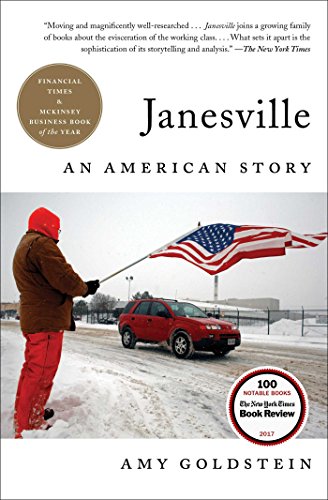
Janesville: An American Story
It’s a perfect example. At the same time, you look at the root cause of that happening. It was a dead body in front of a church. Have you found in your analysis of the things that typically you have these events happen, like these earthquakes that shake a person and make them realize, the pain of staying the same is worse than the pain of changing and making changes. Did you see that as a fundamentally dynamic as far as how communities make the changes and adjustments that will strengthen their core and that pillar?
I’m not sure every community needs to have that wake-up moment. Some will, whether it’s drug abuse, crime or a large employer shutting down. There will be different triggers for them to see that, “Things can’t go on this way. We have to change.” There’s a nice book, Janesville, on how the big employer in town GM shutdown in Wisconsin Town and how the community came together. She leaves it where the community is trying to put things back together, but it’s not successful thus far. Since then, Janesville seems to have made some progress and things are a lot better than they were. In fact to the extent that the community police are issuing parking tickets. That’s a sign of development. You have so much traffic that parking tickets are being issued. More broadly, I would say the reason I emphasize Bilston is I want to say that communities that are far down and plagued by poverty, drug abuse and crime have found ways to lift themselves.
I see this in poor India that there are villages that decide, “We’re not going to depend on the use of government coming in and digging irrigation tanks and irrigation ditches for us, we’re going to do it.” It’s that old frontier mentality in the US that we’re going to do it because there’s nobody else is going to do it for us. That is a mentality, but in a developed country, there are many sources of help also. I’ve been talking, for example, to the Federal Reserve Bank of Philadelphia where they have an entire department which is trying to energize some of these community efforts. Bringing communities together, getting them to learn from each other. There are many sources. There’s a lot of wealth in this country and that wealth is sometimes in private philanthropic ways, for example, the Kaiser Foundation in Tulsa. In public ways we have something called the Opportunity Zone set up by this administration, which essentially offers tax benefits if you invest in communities that are falling behind.
There is help available, but it’s hard for Washington or some far away state capitol to understand what needs to be done in the community. The planning on what needs to be done has to become much more internal. Who would know that the significant problem in Bilston was a crime, that once you dealt with the crime, other magic would happen? It’s trying to figure out what are the two or three key impediments that if I fix it, it will set it back on a virtuous cycle and reverse the vicious cycle that locals know far better. There are many examples, some of which I cite in the book, but elsewhere of people thinking, “What can we do that’s different? What can we do to get the community engaged?” There will be failures, but it’s a way out which is easier in a developed country where the key is attaching yourself back to the national economy.
These are fascinating points. It’s something I think about a lot. I know that there are many others that are asking similar questions as to how is this wealth gap going to end up. It’s moving, but is it moving in the right direction? That’s where you have the primary narrative that exists that the federal government is the power of influence that should be fixing this problem and it continues to build. There’s a lot of movement, especially with the large part of the Democratic Party where the solution isn’t necessarily going back to communities.
The solution is using central powers to influence change through Universal Basic Income or redistribution of wealth. I look at how significant the claims you’re making. You’re trying to solve symptoms with those central-influence initiatives instead of the actual root of the issue. The world is evolving and just to see what the world has done in the last few years is incredible. You look at the central powers, it’s not reasonable for them to adapt to the rate of change that’s occurring because they’re far away and by the time a decision needs to be made, it’s too late.
I look at the significance of your perspective and what you’re making claims on as something that would move the needle. That was the intention of the United States in the beginning, wasn’t it? The reason for the 10th Amendment was to keep powers more local than federal. There are many other questions I have as a follow up to this, but I’d love to see how you’ve looked at the state of the United States when it comes to the immense amount of government power that exists. Their adoption of this role to solve problems and to make everything right. Do you see other signs of how this central influence is shrinking or do you see that there are still issues to be resolved there?
The development bar for every country is different because each country has a different set of resources, capabilities, and impediments. Click To TweetI don’t want to argue to your earlier point that there is no rule for the central government. Since Gerald Ford, every president has been the education president. How are we doing on education? Not very well. We need to figure out alternative approaches. I would agree very much with your thinking that central is difficult because the problem that each place faces is different. Some one size fits all policy device in Washington is not going to work. As support, central is fine. As a prime mover, it’s probably not what the doctor ordered for the country. This chimes well with the resilience and the self-empowerment of people, which has always been true in the United States.
I worry that in these communities, empowerment is feeling that sense of empowerment. That also leads to a different problem, which is that you look to the nation for your identity and for your answers, rather than for the people around you. That’s true in a number of countries. It’s growing in India also. When you start looking for the nation as a resolution and you become more nationalist in spirit. Nationalism is not a bad thing, but nationalism which looks for the enemy as the reason for your problems becomes problematic. It’s easy to point fingers outside, point fingers at minorities within the country, but that’s really no solution because it’s not them who are holding you back. It’s you that has to change. Part of the reason why I emphasize it back to the roots approach is it seems to me we need to rediscover identity back in our communities.
When I say this too many cosmopolitan people who dwell in big cities, they laugh. They say, “We left those communities long back.” In the United Kingdom, 80% of people still identify with their village or their town as their community. They’re not the rootless people that sometimes we see in cities. I’m not saying that’s a bad thing to be a citizen of everywhere, but there are many people who are a citizen of somewhere. It seems to me that they need to find ways to address their problems and we need to think about how that can best be done. This is why I say balance. It’s not all the central government. It’s not all the community. It’s not all the markets. Some balance between the three, which is going to help us get out of our problems.
The fact that this is not the United States problem. It’s a problem in France, in Germany, in China and it’s a problem in India suggest that we need a model for the world of the future. That’s in a sense what I’m trying to propose. At some level, some people have decided that, “Where’s the big tax? Where is the big government program?” These are all milk toast, but there is a big idea here which is let us focus on being a centralized government and governance as the way forward, rather than put more burden on a centralized government in a fractured society yet.
I love how you describe the community in which certain things take place. Going to the original proper role of government was to essentially protect this environment. That’s where obviously the Scottish Enlightenment had much influence on the Founding Fathers to develop the constitution and develop the environment in which commerce was to take place. We’ve gone away from that and it’s understandable. At the same time, there’s always a price to pay and we’re paying it because of how people believe things should be. I look at the future and it’s incredible what human beings have been able to create the potential in one mind can change the world and it could change a community.

Community: It’s a balance between the central government, the community, and the markets which is going to help us get out of our problems.
That’s an environment where you essentially have handouts or you have this theory that you should be taken care of. I don’t know if it ever leads to a person to discovering happiness or fulfillment, which is the general desire of everyone to an extent. That’s where you look at the examples that you cited, whether it’s Chicago or other places where people face adversity and figure out how to make adjustments and thrive because of that. It’s so inspiring but it comes down to the notion of forest and trees, because a forest is an abstract, forest doesn’t exist. A community is also abstract. It’s a group of people. The individual right and the protection of their rights is due to what the individual can create in the right environment if that’s what the overall consensus is.
I look at your experience and you obviously had a front row seat at the financial crisis of 2008 and 2009 and you saw what happens in how decisions at high levels can impact the entire world, which it did. Being a part of a higher education program at the University of Chicago, you come into these conclusions. It isn’t just you waking up in the morning and saying, “I’m going to write a book about this third pillar.” That’s why I find it fascinating how much you’ve experienced where things succeed and where things fail. I’m a fan and I appreciate all the work that you’ve done. Where do you propose your theories? What are you trying to achieve with this book other than getting the ideas out there? Do you have some initiative that you’re trying to push forward?
I’m starting that process and it starts first by publicizing the ideas, but then people start calling you and say, “Come talk to us. We were doing this stuff.” I’m learning more because there are many different ways that communities are coping. I got a call from a group at the World Bank, which is dealing with coal-dependent communities across the world and how they’re dealing with the fact that coal is largely on its way out. How do they recover and what different ways are different groups across the world doing it? This is a powerful way if they figure out what best practices are of trying to spread the word across the world. Here is how they have coped in Austria. Here’s how they coped in Australia. Therefore, let’s figure out whether you can do some of these things.
Part of what I want to do is figure out how you can emphasize more of the success and make it happen more widely. I do want to say that part of this comes from my experience in development. I said I grew up thinking why we are poor? As I looked at development and I studied it, one of the most interesting findings in development is the low explanatory power of influence from outside to how a country develops. You would think a lot of money coming into the country from countries that are giving money from across the world should make this country grow fast. It doesn’t.
For a variety of reasons, it has low power. What happens is when a country like South Korea says, “We’re going to make a change.” The development bar for every country is different because each country has a different set of resources, capabilities and impediments. It’s when they figure out that they need to make a change, it is when the rest of the world can be helpful by buying their goods, trading with them and so on. That idea has percolated into this book, that when you look at successful communities, we don’t know what the recipe is because the recipe is something they figure out because they’re close to the problem. You do know that it often has to come from inside.
Thank you for sharing. I wish you the best. It’s something that is a growing challenge. Humanity is fascinating to observe sometimes where we’re at and we’ve become a global community essentially because of the ease of communication. Sometimes ideas are where most of the power comes from. Getting an idea in a person’s head and then getting it to get out of their head if it’s the wrong idea or unprincipled idea, that’s a big challenge. I look at intellectuals such as yourself and other powers of influence, not necessarily from a central government standpoint, but whether it’s a media or authors that are rising to the challenge.
I was at a financial conference up in Whistler, Canada. Ray Dalio with Bridgewater and a massive hedge fund. The majority of his thoughts were directed toward taking some of his understanding of capitalism, free markets and being able to institute that in Central Connecticut to improve the poverty and crime situation there. It’s one of those things where the problems are getting to the point where they’re boiling over. People like yourself are making and going to make a difference.
Thank you very much. I do hope to stay engaged. I hope we get more people to start thinking about these issues.
Thank you, Dr.Rajan. It’s wonderful having you on and I wish you all the best.
Thanks for taking the time.
Important Links:
- IMF
- Federal Reserve
- Jackson Hole Economic Summit
- Fault Lines: How Hidden Fractures Still Threaten the World Economy
- Saving Capitalism From The Capitalists: Unleashing the Power of Financial Markets to Create Wealth and Spread Opportunity
- The Third Pillar: How Markets and the State Leave the Community Behind
- Dr. Raghuram Rajan
- Bank for International Settlements
- iTunes – The Wealth Standard podcast
- Raj Chetty
- McKinsey
- Jim Heckman
- Bilston Community
- Janesville
- Federal Reserve Bank of Philadelphia
- Kaiser Foundation
- Bridgewater
- https://Faculty.ChicagoBooth.edu/raghuram.rajan/
- https://www.LinkedIn.com/in/raghuram-rajan/detail/recent-activity/
About Raghuram Rajan
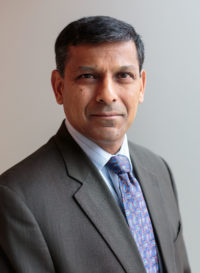 Raghuram Rajan is the Katherine Dusak Miller Distinguished Service Professor of Finance at the Booth School of Business at the University of Chicago. He was the Governor of the Reserve Bank of India between 2013 and 2016, and also served as Vice-Chairman of the Board of the Bank for International Settlements between 2015 and 2016. Dr. Rajan was the Chief Economist and Director of Research at the International Monetary Fund from 2003 to 2006.
Raghuram Rajan is the Katherine Dusak Miller Distinguished Service Professor of Finance at the Booth School of Business at the University of Chicago. He was the Governor of the Reserve Bank of India between 2013 and 2016, and also served as Vice-Chairman of the Board of the Bank for International Settlements between 2015 and 2016. Dr. Rajan was the Chief Economist and Director of Research at the International Monetary Fund from 2003 to 2006.
Dr. Rajan’s research interests are in banking, corporate finance, and economic development, especially the role finance plays in it. He co-authored Saving Capitalism from the Capitalists with Luigi Zingales in 2003. He then wrote Fault Lines: How Hidden Fractures Still Threaten the World Economy, for which he was awarded the Financial Times-Goldman Sachs prize for best business book in 2010. His most recent book, The Third Pillar: How Markets and the State hold the Community Behind was published in 2019.
Dr. Rajan was the President of the American Finance Association in 2011 and is a member of the American Academy of Arts and Sciences and the Group of Thirty. In 2003, the American Finance Association awarded Dr. Rajan the inaugural Fischer Black Prize for the best finance researcher under the age of 40. The other awards he has received include the Deutsche Bank Prize for Financial Economics in 2013, Euromoney magazine’s Central Banker of the Year Award 2014 and The Banker magazine’s Global Central Banker of the Year award in 2016. In that year, Time magazine chose Dr. Rajan as one of the 100 most influential people in the world.

